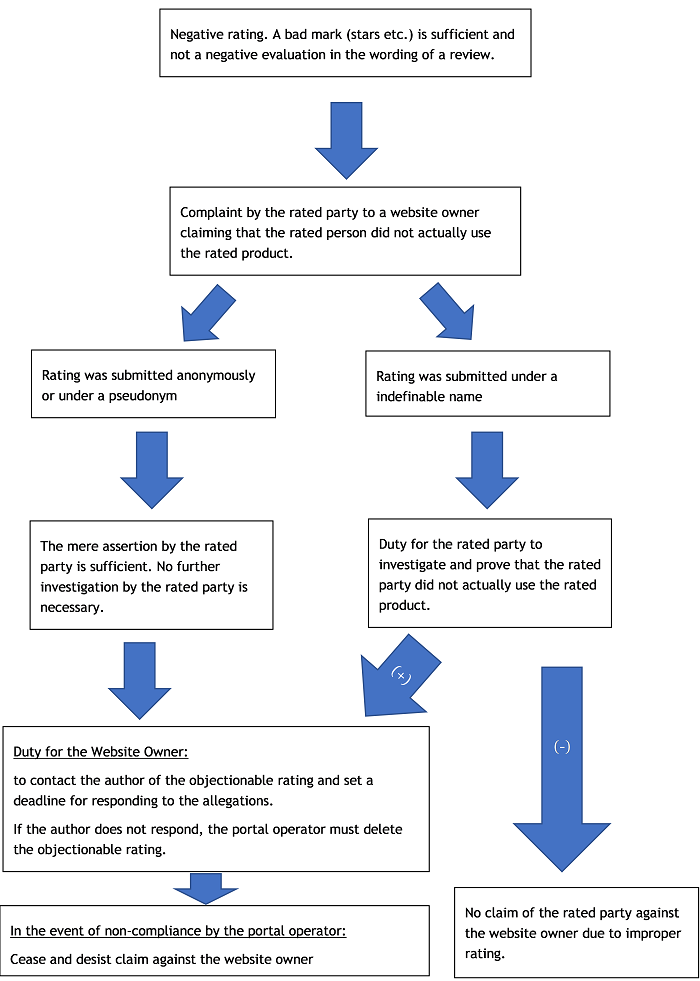Germany: New Federal Supreme Court decision extends liability of website owners for customer reviews
Customer reviews and ratings of products, services or entire businesses are an essential element of e-commerce. They have become an important factor in consumer’s decision making.[1] The internet is full of websites comparing and ranking products of other businesses based on customer’s ratings and reviews.
But what to do when a review is unjustified or defamatory? Owners of websites that publish such reviews and ratings are usually the first point of call for the aggrieved party, as the authors of the reviews are often not easily identifiable due to the use of pseudonyms or even anonymous reviews.
However, those website owners generally do not have the duty to proactively monitor the reviews. This changes once they have actual knowledge of a certain review. In that event the website owner has to investigate the matter and, if the complaint by the rated party proves correct, remove the review from its website.
But what does actual knowledge mean? What information does the aggrieved party need to provide to the website owner so he/she has actual knowledge?
Not much – according to a recent decision the German Federal Supreme Court (Decision of 09 August 2022 – File-No.: VI ZR 1244/20; BGH GRUR-RS 2022, 21876). If the author of a review or rating cannot be clearly identified, the following information provided to the website owner publishing the review or rating can be enough to trigger legal liability:
- the rating or review is negative (a low rating, such as 2 out 5 Stars, can be enough) and
- the allegation that the author of the rating or review has not purchased the product or used the service which is subject to the review or rating.
Background of the decision:
The case concerned the operator of a hotel booking portal, which was sued by the owner of a holiday park for the deletion of a number of negative ratings relating to this holiday park. The reviews in question were submitted by users of the portal under pseudonyms. The holiday park owner had requested the booking portal to delete the reviews. The holiday park owner claimed that the authors of the reviews had never stayed at the holiday park. This claim was not substantiated by any further facts - not even in the course of the subsequent court proceedings.
Like the previous instances, the Federal Supreme Court ruled in favour of the claim.
The findings of the Federal Supreme Court:
As already held in previous decisions on this subject[2], there is no pro-active duty for the operators of rating portals to review the content of the ratings and reviews. If there is an indication of possibly illegal content, the portal operator has a duty to review and, if necessary, delete the content concerned. If the portal operator does not comply with this duty, a claim can be brought against it for failure to publish the affected reviews.
In the present decision, the BGH has further specified what such a notice must look like. For better comprehensibility, we have drawn up a diagram based on the findings of this case:

For business owners this decision facilitates taking action against unjustified ratings and reviews. Given the detrimental effects that such reviews can have this is good news for business owners.
At the same time ranking platforms or any other websites publishing consumers reviews and ratings concerning third party products may have to adjust their complaint procedures.
Wherever website owners offer the option to users to publish reviews and ratings directly on their website they should consider how they deal with anonymous reviews and ratings. On the one hand making the disclosure of the author’s real name conditional for publishing may deter some users from providing reviews or ratings in the first place. On the other hand such a measure could reduce the amount of unjustified ratings/reviews and consequently possible complaints by the rated parties.
[1] see e.g. EU Commission Market Monitoring Survey 2019-2020, Overview report for the 22 markets, page 19 - https://ec.europa.eu/info/sites/default/files/mms-overview-report-19-20_en.pdf
[2] BGH GRUR 2004, 860 - Internet-Versteigerung; BGH GRUR 2007, 708 marginal no. 45 - Internet-Versteigerung II; GRUR 2013, 370 marginal no. 28 - Alone in the Dark



